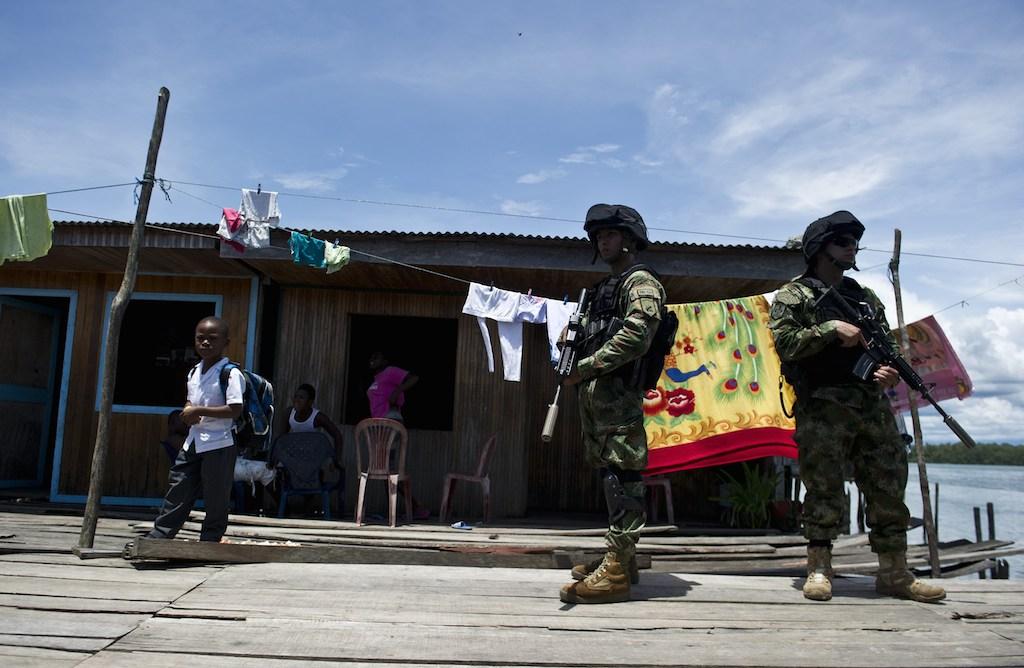Gangs still run nightmarish ‘chop-up’ houses in this Colombian drug hub
Colombian marines in Buenaventura, Valle del Cauca department, Colombia, in March 2014.
LIMA, Peru — Colombia’s peace talks may be advancing, but try telling that to the terrified residents of Buenaventura, the country’s largest Pacific port.
They continue to live in the constant shadow of rapes, grotesque violence and disappearances carried out by successor groups to the hard-right paramilitary vigilantes who once battled Marxist rebels' fire with fire.
In particular, the gangs have become known for their “chop-up” houses, where they use machetes to dismember alive anyone who gets on their wrong side, Human Rights Watch says in a new report.
It singles out a trio of rival groups — the Urabeños, Empresa and Autodefensas Gaitanistas — that have turned to organized crime since the “deeply flawed official demobilization” of the paramilitaries a decade ago.
Disbanding death squads was intended to be a key step in stopping the South American country’s internal conflict that’s cost nearly 250,000 lives over the last half-century. The conflict pits the government and the paramilitaries against leftist rebel group the Revolutionary Armed Forces of Colombia (FARC), with the latter two heavily implicated in the cocaine trade.
Buenaventura is a notorious drug-trafficking hub.
The right-wing gangs have divided the sprawling port city of 330,000 largely Afro-Colombian residents into three distinct territories with “invisible borders,” the report says.
For locals, just straying onto the wrong side of the block, in a rival gang’s turf, can lead to a grisly death.
Living from extortion, drug trafficking and kidnapping, the gangs forcibly recruit kids as young as 10 and have turned large parts of Buenaventura into police no-go zones, Human Rights Watch says.
In the past, victims’ corpses would often be dumped at sea. But now, to prevent body parts from washing ashore, they are typically buried in clandestine graves.
One local who has suffered more than enough is Luz Marina Arbolea, a 74-year-old retired fish seller.
In 2010, her son Wilmar, a dockworker, vanished without a trace as he celebrated his 30th birthday early one evening with friends.
His body has never been found and no witnesses are willing to come forward, meaning she still does not know what happened to him, never mind why.
As if that wasn’t enough, his brother Milton, also a dockworker, was shot dead in Buenaventura in 1999, at age 29, in another unresolved crime. And Wilmar’s twin Wilber, who ran a fruit stand in the capital Bogota, was murdered last year in that city in an unrelated killing.
“The pain has broken my soul,” Arbolea told GlobalPost. “I learned about Wilmar from my granddaughter. She called to ask where her father was. He had been having a drink with friends and that was the last we heard from him.”
“Losing one son is more than any mother should have to bear. And then to not even know what’s happened has been too much. It has ruined me, made me sick.”
“They were all hardworking, honest boys. They just wanted to get ahead in life.”
The government of President Juan Manuel Santos has attempted to retake control of the port since a previous Human Rights Watch report last March.
Officials say the deployment of security forces in the city has had some progress bringing crime down and arresting criminals, the Wall Street Journal reported.
“Every case is moving forward,” Luis Gonzalez, head of the attorney general's criminal and forensic unit, told the Journal. “We are here, and we are going to stay.”
Rights groups have noted some government efforts but say they haven’t been enough.
“A year has passed since the government announced it was going to take action in Buenaventura, and powerful criminal groups are still terrorizing residents,” said Jose Miguel Vivanco, Human Rights Watch’s Americas director. “Government measures have helped reduce violence, but the gangs’ brutal control over many neighborhoods remains fundamentally unchanged.”
According to Human Rights Watch’s numbers:
• 32 dismembered bodies have been found since 2013, at least 12 of whom appear to have been killed since its first report on Buenaventura.
• 13,682 people were driven from their homes by threats and violence between April and September last year.
• There were 96 reported homicides between April and December, down from 150 in the same period of 2013, but still astronomically high for a relatively small city.
Vivanco warns that many disappearances may never have been reported because grieving relatives are intimidated into keeping mum.
More from GlobalPost: These are the world’s deadliest cities
Meanwhile, a single prosecutor in the port city is responsible for investigating a backlog of 400 disappearances. Perhaps unsurprisingly, she has issued just five arrest warrants so far and obtained not a single conviction.
“The Santos administration is a long way from fulfilling its promise to change conditions in Buenaventura,” Vivanco added. “Authorities must do a lot more to end the terror in Colombia’s main Pacific port and deliver justice for victims of abuse.”
Every day, reporters and producers at The World are hard at work bringing you human-centered news from across the globe. But we can’t do it without you. We need your support to ensure we can continue this work for another year.
Make a gift today, and you’ll help us unlock a matching gift of $67,000!
